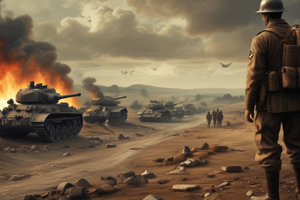Podcast
Questions and Answers
What was the main cause of the outbreak of World War I?
What was the main cause of the outbreak of World War I?
The assassination of Archduke Franz Ferdinand of Austria-Hungary by Gavrilo Princip, a Serbian nationalist
What was the significance of the Battle of Verdun in World War I?
What was the significance of the Battle of Verdun in World War I?
It was a prolonged and bloody battle between French and German forces that resulted in heavy losses on both sides.
What was the main reason for the United States' entry into World War II?
What was the main reason for the United States' entry into World War II?
Germany's resumption of unrestricted submarine warfare and the sinking of the Lusitania
What was the significance of the Atomic Bombings of Hiroshima and Nagasaki in World War II?
What was the significance of the Atomic Bombings of Hiroshima and Nagasaki in World War II?
What was the main outcome of the Treaty of Versailles after World War I?
What was the main outcome of the Treaty of Versailles after World War I?
Flashcards are hidden until you start studying
Study Notes
World War I
Causes of the War
- Assassination of Archduke Franz Ferdinand of Austria-Hungary by Gavrilo Princip, a Serbian nationalist
- Imperialism and colonial rivalries between European powers
- Nationalism and militarism in various countries
- Alliance system: Triple Entente (France, Russia, Britain) and Triple Alliance (Germany, Austria-Hungary, Italy)
Major Events of the War
- Battle of the Frontiers (1914): Initial battles between German and French forces
- Battle of Tannenberg (1914): German victory over Russia
- Battle of Verdun (1916): Prolonged and bloody battle between French and German forces
- Battle of Somme (1916): British offensive that resulted in heavy losses
- US Entry into the War (1917): Following Germany's resumption of unrestricted submarine warfare and the sinking of the Lusitania
Treaty of Versailles (1919)
- Imposed harsh penalties on Germany, including massive reparations and territorial losses
- Established the League of Nations, an international organization aimed at promoting peace and preventing future wars
World War II
Causes of the War
- Rise of fascist and nationalist ideologies in Germany, Italy, and Japan
- Appeasement policy of Britain and France towards Germany
- German aggression: annexation of Austria, invasion of Czechoslovakia, and invasion of Poland
Major Events of the War
- Blitzkrieg (1939-1940): German invasion of Poland, followed by the fall of Denmark, Norway, Belgium, the Netherlands, and France
- Battle of Britain (1940): German air campaign against Britain
- Invasion of the Soviet Union (1941): German attack on the Soviet Union, known as Operation Barbarossa
- Pearl Harbor (1941): Japanese surprise attack on the US naval base in Hawaii, drawing the US into the war
- D-Day (1944): Allied invasion of Normandy, France
- Atomic Bombings of Hiroshima and Nagasaki (1945): US bombings of Japanese cities, leading to Japan's surrender
Consequences of the War
- Estimated 50-80 million fatalities
- Destruction of many cities and communities
- Establishment of the United Nations (1945) to promote international cooperation and prevent future wars
- Rise of the United States and the Soviet Union as superpowers, leading to the Cold War
World War I
Causes of the War
- Assassination of Archduke Franz Ferdinand of Austria-Hungary by Gavrilo Princip, a Serbian nationalist, on June 28, 1914
- Imperialism and colonial rivalries between European powers, including Britain, France, Germany, and Austria-Hungary
- Nationalism and militarism in various countries, particularly in the Balkans
- Complex system of alliances: Triple Entente (France, Russia, Britain) and Triple Alliance (Germany, Austria-Hungary, Italy)
Major Events of the War
- Battle of the Frontiers (1914): Initial battles between German and French forces, resulting in heavy losses
- Battle of Tannenberg (1914): German victory over Russia, considered one of the largest battles in history
- Battle of Verdun (1916): Prolonged and bloody battle between French and German forces, lasting 303 days
- Battle of Somme (1916): British offensive that resulted in heavy losses, with over 1 million casualties
- US Entry into the War (1917): Following Germany's resumption of unrestricted submarine warfare and the sinking of the Lusitania
Treaty of Versailles (1919)
- Imposed harsh penalties on Germany, including massive reparations and territorial losses
- Established the League of Nations, an international organization aimed at promoting peace and preventing future wars
World War II
Causes of the War
- Rise of fascist and nationalist ideologies in Germany, Italy, and Japan
- Appeasement policy of Britain and France towards Germany, including the Munich Agreement
- German aggression: annexation of Austria (Anschluss), invasion of Czechoslovakia, and invasion of Poland
Major Events of the War
- Blitzkrieg (1939-1940): German invasion of Poland, followed by the fall of Denmark, Norway, Belgium, the Netherlands, and France
- Battle of Britain (1940): German air campaign against Britain, including the Blitz bombings
- Invasion of the Soviet Union (1941): German attack on the Soviet Union, known as Operation Barbarossa
- Pearl Harbor (1941): Japanese surprise attack on the US naval base in Hawaii, drawing the US into the war
- D-Day (1944): Allied invasion of Normandy, France, marking a turning point in the war
- Atomic Bombings of Hiroshima and Nagasaki (1945): US bombings of Japanese cities, leading to Japan's surrender
Consequences of the War
- Estimated 50-80 million fatalities, making it one of the deadliest conflicts in human history
- Massive destruction of many cities and communities
- Establishment of the United Nations (1945) to promote international cooperation and prevent future wars
- Rise of the United States and the Soviet Union as superpowers, leading to the Cold War
Studying That Suits You
Use AI to generate personalized quizzes and flashcards to suit your learning preferences.




